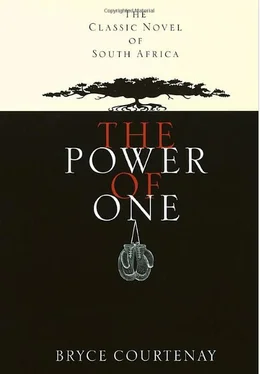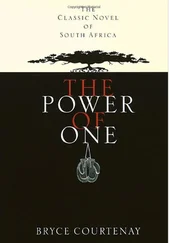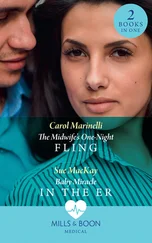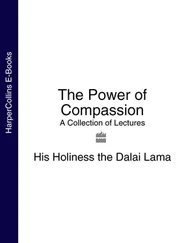Брайс Кортни - The Power of One
Здесь есть возможность читать онлайн «Брайс Кортни - The Power of One» весь текст электронной книги совершенно бесплатно (целиком полную версию без сокращений). В некоторых случаях можно слушать аудио, скачать через торрент в формате fb2 и присутствует краткое содержание. Жанр: Современная проза, на английском языке. Описание произведения, (предисловие) а так же отзывы посетителей доступны на портале библиотеки ЛибКат.
- Название:The Power of One
- Автор:
- Жанр:
- Год:неизвестен
- ISBN:нет данных
- Рейтинг книги:4 / 5. Голосов: 1
-
Избранное:Добавить в избранное
- Отзывы:
-
Ваша оценка:
- 80
- 1
- 2
- 3
- 4
- 5
The Power of One: краткое содержание, описание и аннотация
Предлагаем к чтению аннотацию, описание, краткое содержание или предисловие (зависит от того, что написал сам автор книги «The Power of One»). Если вы не нашли необходимую информацию о книге — напишите в комментариях, мы постараемся отыскать её.
The book is made to movie with the same name.
The Power of One — читать онлайн бесплатно полную книгу (весь текст) целиком
Ниже представлен текст книги, разбитый по страницам. Система сохранения места последней прочитанной страницы, позволяет с удобством читать онлайн бесплатно книгу «The Power of One», без необходимости каждый раз заново искать на чём Вы остановились. Поставьте закладку, и сможете в любой момент перейти на страницу, на которой закончили чтение.
Интервал:
Закладка:
Doc taught me the names of the flowering plants. The sugarbush with its splashy white blossoms. A patch of brilliant orange-red seen in the distance usually meant wild pomegranate. I learned to differentiate between species of tree fuchsia, to stop and crush the leaves of the camphor bush and breathe its beautiful aromatic smell. I recognised the pale yellow blossoms of wild gardenia and the blooms of the water alder. Monkey rope strung from tall trees draped with club moss was given names such as: traveller’s joy, lemon capers, climbing saffron, milk rope and David’s roots. Nothing escaped Doc’s curiosity and he taught me the priceless lesson of identification. Soon trees and leaves, bush, vine and lichen began to assemble in my mind in a schematic order as he explained the nature of the ecosystems of bush and kloof and high mountain.
‘Everything fits, Peekay. Nothing is unexplained. Nature is a chain reaction. One thing follows the other, everything is dependent on something else. The smallest is as important as the largest. See,’ he would say, pointing to a tiny vine curled around a sapling, ‘that is a stinkwood sapling which can grow thirty metres, but the vine will win and the tree will be choked to death long before it will ever see the sky.’
He would often use an analogy from nature. ‘Ja, Peekay, always in life an idea starts small, it is only a sapling idea, but the vines will come and they will try to choke your idea so it cannot grow and it will die and you will never know you had a big idea, an idea so big it could have grown thirty metres through the dark canopy of leaves and touched the face of the sky.’ He looked at me and continued, ‘The vines are people who are afraid of originality, of new thinking; most people you encounter will be vines, when you are a young plant they are very dangerous.’ His piercing blue eyes looked into mine. ‘Always listen to yourself, Peekay. It is better to be wrong than simply to follow convention. If you are wrong, no matter, you have learned something and you will grow stronger. If you are right you have taken another step towards a fulfilling life.’ He would sigh and squint at me. ‘Experts, what did I tell you about experts, Peekay?’
‘You can’t always go by expert opinion. A chicken, if you ask a chicken, should be stuffed with grasshoppers, mealies and worms.’ Even after repeating it a hundred times I still thought it was funny.
Or Doc would show me how a small lick of water trickling from a rock face would, drop by drop, gather round its wet apron fern and then scrub and later trees and vines until the kloof became an interdependent network of plant, insect, bird and animal life. ‘Always you should go to the source, to the face of the rock, to the beginning. The more you know, the more you can control your destiny. Man is the only animal who can store knowledge outside his body. This has made him greater than the creatures around him. Everything has happened before, if you know what comes before then you know what happens now. Your brain, Peekay, has two functions; it is a place for original thought, but also it is a reference library, use it to tell you where to look and then you will have for yourself all the brains that have ever been.’
Doc never talked down. Much of what he said would take me years to understand, but I soaked it up nevertheless, storing it in my awkward young mind where it could mature and later come back to me. He taught me to read for meaning and information, to make margin notes and to follow these up with trips to the Barberton library where Mrs Boxall would give a great sigh when the two of us walked in. ‘Here come the messpots!’ She claimed she had to spend hours erasing the pencilled margin notes in the books we borrowed. Doc once insisted they made the books more valuable and Mrs Boxall arched an eyebrow, ‘Written in German and in Kindergarten, Professor?’
Doc shrugged, looking up from his book and removing his gold-rimmed reading glasses. ‘Kindergarten, that also is written in German, Madame Boxall.’
But I don’t think Mrs Boxall really minded. The books on birds and insects and plants were seldom borrowed by anyone else and besides, as most of the books in the natural history section had once belonged to him, Doc adopted a proprietorial attitude towards the town library. Over the years his tiny cottage had become too small to contain them all and they had been bequeathed to the library which now acted, in Doc’s mind anyway, as a bibliographical outpost to his cottage. Doc also taught me Latin roots so I was no longer forced to resort to memory alone and the botanical names of plants began to make sense to me.
We climbed to the high kranses and the crags in search of cactus and succulents. Towards the end of summer, on the side of a mountain scarred by loose grey shale and tufts of coarse brown grass I stumbled on Aloe brevifolia , a tiny thorny aloe.
Doc was overjoyed. ‘Gold! Absolute gold!’ He jumped into the air and, upon landing, missed his footing on the shaly surface and fell arse over tip down the mountain, coming to a halt just short of a two-hundred-foot drop. He climbed gingerly back, hands bleeding from clutching at the sharp shale, a sheepish grin on his weather-beaten face. But the triumph of the rare find still showed in his excited eyes. ‘Brevifolia in these parts, so high, impossible! You are a genius, Peekay. Absoloodle!’
It was the find of the summer and, to Doc, worth all the weary hours spent on the hills and in the mountains. We recorded the find with the camera and removed six of the tiny plants, leaving double that number clinging precariously to the inhospitable mountainside.
Like me, Doc was an early riser, so just after dawn all that summer he gave me piano lessons. ‘In one year we will tell, but it is not so important. To love music is everything. First I will teach you to love music, after this slowly we shall learn to play.’
I was anxious to please Doc and worked hard, but I suspect he knew almost from the outset that I wouldn’t prove an especially gifted musician. My progress, while superior to that of the small girls he was obliged to teach for a living, indicated a very modest talent. In the years that followed, it was enough to fool my mother and all the big-bosomed matriarchs who ruled the town’s important families. At concerts which, I hasten to add, were not in my honour, I represented the cultured element and they would applaud me deliberately and loudly.
These occasions, which occurred in the spring and autumn, made my mother very proud, though they also represented a compromise with the Lord. Concerts were the devil’s work and very much against the Lord’s teaching. They were just the sort of thing which, like money-lending, the Lord had clearly condemned when he castigated the Pharisees and Saducees in the temple of Jerusalem. She justified my participation and her attendance by pointing out, to herself mostly, that many of the great classical musicians wrote music for the church.
The Lord’s will was equally explicit on drinking and smoking, the bioscope and dancing, except ballet. Ballet was another of the items cherished by the lavender-scented ladies from the town’s upper-echelon families, and the ballet performance usually preceded my piano recital. Together they made up the cultural component of the twice-yearly concert. Chopin, by yours truly, and Tchaikovsky’s Dance of the Swans by gramophone record, danced to by six-year-old neophytes in white tutus and duckbilled headdresses made of papier mâché.
We were the cultural meat in a popular sandwich otherwise liberally filled with amateur vaudeville acts, solo songs of an Irish nature, single or combined concertina, piano accordion and guitar renditions of well-known Afrikaans folk songs usually performed by the Afrikaner warders from the prison. To redress the racial balance, a Gilbert and Sullivan male quartet would generally follow. One English comic opera song was reckoned by the concert committee to equate roughly with a dozen Afrikaans folk songs no matter how pleasingly syncopated, harmonised, toe tappin’ and hand clappin’ they might prove to be.
Читать дальшеИнтервал:
Закладка:
Похожие книги на «The Power of One»
Представляем Вашему вниманию похожие книги на «The Power of One» списком для выбора. Мы отобрали схожую по названию и смыслу литературу в надежде предоставить читателям больше вариантов отыскать новые, интересные, ещё непрочитанные произведения.
Обсуждение, отзывы о книге «The Power of One» и просто собственные мнения читателей. Оставьте ваши комментарии, напишите, что Вы думаете о произведении, его смысле или главных героях. Укажите что конкретно понравилось, а что нет, и почему Вы так считаете.












